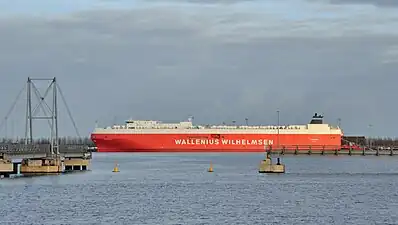 Tønsberg in the port of Bruges-Zeebrugge | |
| History | |
|---|---|
| Name | Tønsberg |
| Namesake | Tønsberg |
| Owner | Wilh. Wilhelmsen |
| Port of registry | Valletta, Malta[1] |
| Builder | Mitsubishi Heavy Industries, Nagasaki, Japan[2] |
| Launched | 2 October 2010 |
| Identification |
|
| General characteristics | |
| Class and type | Mark V[2] |
| Type | roll-on/roll-off |
| Tonnage | |
| Length | 265 metres (869 ft)[2] |
| Beam | 32.27 metres (105.9 ft)[1] |
| Decks | Six fixed decks; three hoistable decks[2] |
| Installed power | MAN B&W 7L70ME engine[3] providing 20,100 kilowatts (27,000 hp) |
| Propulsion | 7.3m diameter 6-bladed propeller; two 2,500-kW Kawasaki thrusters (one stern, one bow) |
| Speed | 20.25 knots (37.50 km/h; 23.30 mph)[4] |
| Capacity | |
MV Tønsberg is a roll-on/roll-off ship owned by Wilh. Wilhelmsen. As of 2012 it is the largest RORO ship in the world.[5]
Specification
- Dimensions: MV Tønsberg is 265 m (869 ft) length overall and 32.26 m (105.8 ft) wide, and has 11 m (36 ft) draught and 46 m (151 ft) of air draught. Gross tonnage is 76,500 gt. Capacity is 5% – 7% higher than Mark IV roro ships.
- Decks: Six fixed decks and three hoistable ones (4B, 6 and 8, lifted by electric winches). The main deck can take loads 7.1 m high – more than other vessels – allowing very large loads. The total deck space is 50,335 m2 and cargo volume is 138,000 m³. Internal ramps are 8 metres wide; The weather deck (which can be used for outsize or unusual loads, such as wind turbine blades) also has a 4m wide ramp from below, to reduce the need for cranes.[6]
- Stern ramp: The stern ramp is 12 m (39 ft) wide and can take loads of 505 tonnes.
- Design: Hull form has been improved, so compared to previous ships it will use 15 – 20% less fuel per unit of cargo.[2] Stability has been improved, to reduce the need for ballast water. There is a double bottom and Deck 5 is also watertight.
- Propulsion: 7-cylinder MAN B&W engine, which has been derated from 22,890 kW[3] to 20,100 kW MCR at 108rpm; (although normal output in service is 18,090 kW), driving a 7.3 m (24 ft) diameter 6-bladed propeller; plus two 2,500 kW Kawasaki thrusters (one each at the bow and the stern). Service speed is 20.25 knots.[7]
History
MV Tønsberg is the fourth Wilhelmsen ship to carry this name; it's named after the Norwegian coastal town where Wilhelmsen was founded in 1861.[8] It was built to celebrate the 150th anniversary of Wilh. Wilhelmsen line. It is the first in a series of four "Mark V" ships, built in 2010-2011 by Mitsubishi Heavy Industries shipyard in Nagasaki, in Japan.[7] The second ship of the class, Parsifal, was delivered in September 2011.[9]
In June 2012, Tønsberg was awarded "Ship of the Year 2011" by the Japan Society of Naval Architects and Ocean Engineers, recognising its efficiency and environmental compatibility.[10]
References
- 1 2 3 4 5 6 7 "TONSBERG". Marine Traffic. Retrieved 7 April 2016.
- 1 2 3 4 5 6 "Wilh. Wilhelmsen launches next generation cargo vessel". Wilhelmsen press release. Archived from the original on 7 May 2012. Retrieved 1 July 2012.
- 1 2 "MAN B&W L70ME-C8-TII Project Guide" (PDF). MAN. Retrieved 31 July 2012.
- 1 2 "Tønsberg". wilhelmsenasa.com. Retrieved 7 April 2016.
- ↑ "Wilhelmsen launches largest ro-ro ship". Logistics Manager. Archived from the original on 27 January 2013. Retrieved 1 July 2012.
- ↑ "Wilh. Wilhelmsen launches next generation ro-ro ship". Heavy Lift & project Forwarding International. Archived from the original on 25 January 2013. Retrieved 1 July 2012.
- 1 2 "Wilhelmsen new ro-ro is biggest ever". The Motorship. 28 May 2011. Archived from the original on 2 July 2012. Retrieved 1 July 2012.
- ↑ "Utsatt dåp for verdens største RoRo skip". skips-revyen. 17 March 2011. Archived from the original on 24 June 2012. Retrieved 1 July 2012.
- ↑ "Parsifal hits new notes for heavy lift". Heavy Lift & project Forwarding International. Archived from the original on 25 January 2013. Retrieved 1 July 2012.
- ↑ "TØNSBERG, MHI's Massive RO/RO Vessel, Awarded "Ship of the Year 2011": High Transport Efficiency and Environmental Compatibility Recognized". Mitsubishi Heavy Industries. Archived from the original on 17 June 2012. Retrieved 1 July 2012.
External links
This article is issued from Wikipedia. The text is licensed under Creative Commons - Attribution - Sharealike. Additional terms may apply for the media files.